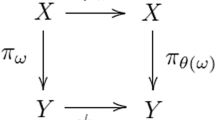Abstract
The aim of this paper is to demonstrate that topological fixed point theorems have no canonical generalization to the case of random dynamical systems. This is done by using tools from algebraic ergodic theory. We give a criterion for the existence of invariant probability measures for group valued cocycles. With that, examples of continuous random dynamical systems on a compact interval without random invariant points, which are an appropriate generalization of fixed points, are constructed.
Similar content being viewed by others
REFERENCES
Arnold, L. (1998). Random Dynamical Systems, Springer, Berlin/Heidelberg/New York.
Arnold, L. (1995). Random dynamical systems. In Johnson, R. (ed.), Dynamical Systems. Lecture Notes Math. 1609, Springer, Berlin/Heidelberg/New York, pp. 1–43.
Arnold, L., and Boxler, P. (1991). Additive noise turns a hyperbolic fixed point into a stationary solution. In Arnold, L., Crauel, H., and Eckmann, J.-P. (eds.), Lyapunov Exponents, Oberwolfach 1990. Lecture Notes Math. 1486, Springer, Berlin/Heidelberg/New York, pp. 159–164.
Crauel, H. (1995). Random Probability Measures on Polish Spaces, Habilitationsschrift, Bremen.
Keynes, H. B., and Newton, D. (1974). The structure of ergodic measures for compact group extensions. Israel J. Math. 18, 363–389.
Knill, O. (1991). The upper Lyapunov exponents of SL(2, ℝ) cocycles: Discontinuity and the problem of positivity. In Arnold, L., Crauel, H., and Eckmann, J.-P. (eds.), Lyapunov Exponents, Oberwolfach 1990. Lecture Notes Math. 1486, Springer, Berlin/Heidelberg/New York, pp. 86–97.
Liu, P.-D. (1988). Random perturbations of Axiom A basic sets. J. Stat. Phys. 90, 467–490.
Ochs, G. (1998). Examples of random dynamical systems without random fixed points. Universitatis Iagellonicae Acta Mathematica, Fasc. XXXVI, Krakow, pp. 133–141.
Parthasarathy, K. R. (1967). Probability Measures on Metric Spaces, Academic Press, New York and London.
Schmalfuß, B. (1996). A random fixed point theorem based on Lyapunov exponents. Rand. Comp. Dyn. 4, 267–268.
Schmalfuß, B. (1997). A random fixed point theorem and the random graph transformation. Report No. 402, Institut für Dynamische Systeme, Bremen.
Schmidt, K. (1981). Amenability, Kazdan's property T, strong ergodicity and invariant means for ergodic group actions. Ergod. Theory Dynam. Syst. 1, 223–236.
Zimmer, R. (1977). Random walks on compact groups and the existence of cocycles. Israel J. Math. 26, 84–90.
Author information
Authors and Affiliations
Rights and permissions
About this article
Cite this article
Ochs, G., Oseledets, V.I. Topological Fixed Point Theorems Do Not Hold for Random Dynamical Systems. Journal of Dynamics and Differential Equations 11, 583–593 (1999). https://doi.org/10.1023/A:1022670227876
Issue Date:
DOI: https://doi.org/10.1023/A:1022670227876




